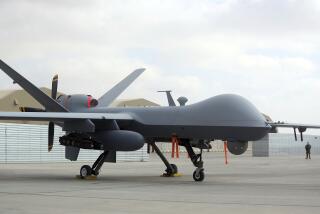U.S. Refines Its Plans to Enforce Serb Flight Ban
- Share via
WASHINGTON — The Pentagon has begun refining plans to use American military power in the Balkans should the U.N. Security Council ask for allied help in enforcing the “no-fly zone” over Bosnia-Herzegovina, U.S. officials said Monday.
Plans call for initial monitoring and enforcement operations by F-14 Tomcat fighters and FA-18 Hornet attack bombers from the aircraft carrier John F. Kennedy, with help from AWACS radar surveillance planes.
At the same time, the Navy is considering the use of specially rigged Tomahawk cruise missiles to cripple Serbian-held airports in the region, should the Security Council decide to take that step during its deliberations.
American officials said the Tomahawks would be equipped with special warheads that would drop pellets of explosives along runways at airports being used for Serbian flights. The British used a similar tactic during the Persian Gulf War.
The disclosures came as the United States, Britain and France began laying the groundwork at the United Nations for the council’s consideration later this week of a special resolution to enforce the no-fly zone.
Last weekend, President Bush and British Prime Minister John Major urged enforcement of the no-fly restrictions, which ostensibly prohibit flights of Serbian military aircraft over Bosnian airspace.
Diplomats said that representatives of four of the five permanent members of the Security Council--the United States, Britain, France and Russia--met Monday morning to discuss the wording of an enforcement resolution but did not agree on a formal draft. China, the fifth permanent member of the council, did not attend the session. China generally has opposed military intervention by the United Nations.
Although diplomats declined to say when the council might take up a resolution, Secretary of State Lawrence S. Eagleburger has said the move probably will come soon, in time to push the resolution through before Christmas.
It was not clear, however, just how far the resolution might go.
Western diplomats said the United States and its allies still are divided over two key issues--how long a warning period to give the Serbs before beginning military action to enforce the ban and how much leeway to give the military in deciding how to do the job.
They said that Britain and France want to set the warning period at three weeks while Washington wants to give the Serbs no more than two weeks to stop violating the no-fly restrictions.
At the same time, the United States wants U.N. forces to be able to shoot down errant Serbian aircraft and to bomb the airfields that they are using to launch attacks on Bosnia, while Britain and France oppose authorizing U.N. pilots to fire on Serbian planes and facilities.
Both Britain and France fear that Serbian retaliation could endanger their own ground troops, which are participating in U.N. peacekeeping operations in Bosnia. The United States has no ground troops in the area.
Serbian leaders have warned that they will consider U.N. troops to be hostile forces if the allies begin enforcing the no-fly zone. Allied governments also fear that the Serbs may block relief convoys to Sarajevo if the no-fly zone is enforced.
The Security Council action has been complicated by uncertainty over Sunday’s Serbian presidential election, which could be a key factor in deciding how rapidly the United States and its allies move to enforce the no-fly zone. Officials said that Western powers have planned to step up enforcement of the zone quickly if incumbent President Slobodan Milosevic wins. The United States has said that Milosevic should be a key individual in any war-crimes prosecution because of the role he has played in promulgating the war against Bosnia.
The Serbian government said Monday that Milosevic appears to have taken the lead in Sunday’s balloting. Rival Milan Panic, the Yugoslav-born Orange County millionaire, has charged widespread fraud. But diplomats say that Panic’s chances of succeeding in his challenge are slim. Final results are not expected until Thursday.
On Monday, the Bush Administration strongly criticized the handling of the election. State Department spokesman Richard A. Boucher said that, while American officials had not made a final determination, evidence shows the campaign was “decidedly unfair.” Boucher cited several examples of such irregularities, from manipulation of election rules to hamper opposition candidates to television bias against Panic’s candidacy to omission of many voters from registration lists.
Officials said Monday that the pace of the Security Council action also may have been slowed by pleas from special U.N. envoy Cyrus R. Vance last week that the United Nations intensify its diplomatic efforts to stop the fighting before resorting to military intervention.
The Security Council imposed the no-fly zone over Bosnia on Oct. 9, but Western intelligence sources say that Serbian military forces have conducted about 240 separate flights since then--mostly to transport military officials but partly to resupply ground troops.
U.N. officials say that a second resolution is needed to empower the allies to police the area. Pentagon officials said they see few problems in prohibiting Serbian aircraft from flying, but they conceded that they could run into difficulties--with substantially more aircraft required--if the Serbs respond with antiaircraft fire.
Members of the North Atlantic Treaty Organization have agreed to take on the job of enforcing any new U.N. resolution. Officials said any American military efforts presumably would be part of a NATO action to help enforce the U.N. restrictions.
The effort possibly would be under joint command with the Western European Union, a European military group that includes France, which does not participate militarily in NATO.
The entry of American warplanes would mark the first active American role in Bosnia since the crisis began more than a year ago, except for the recent participation of U.S. naval vessels in a blockade of the Adriatic.
More to Read
Sign up for Essential California
The most important California stories and recommendations in your inbox every morning.
You may occasionally receive promotional content from the Los Angeles Times.













